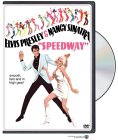| Reviews & Columns |
|
Reviews DVD TV on DVD Blu-ray 4K UHD International DVDs In Theaters Reviews by Studio Video Games Features Collector Series DVDs Easter Egg Database Interviews DVD Talk Radio Feature Articles Columns Anime Talk DVD Savant Horror DVDs The M.O.D. Squad Art House HD Talk Silent DVD
|
DVD Talk Forum |
|
|
| Resources |
|
DVD Price Search Customer Service #'s RCE Info Links |
|
Columns
|
|
|
Speedway
The film plays heavily on Elvis's love of cars and his famous generosity. This time he's famous stock car racer Steve Grayson, who lives the good life in his doublewide mobile home. When he runs into a down-on-his-luck ex-racer and widower, Abel Esterlake (William Schallert), and learns that he and his five young daughters are living out of a beat-up station wagon, Steve buys them a new station wagon to live in. He also helps out waitress Lori (Charlotte Considine, later schoolteacher Miss Beadle on Little House on the Prairie), buying her a trailer-load of furniture for her wedding day.
Meanwhile, both Elvis and childhood friend/no account manager Kenny (Bill Bixby, his hair apparently lightened to better contrast Elvis's usual oil slick) find little luck chasing after mysterious Susan Jacks (Nancy Sinatra). She turns out to be an agent for IRS investigator R.W. Hepworth (Gale Gordon, "Mr. Mooney" from The Lucy Show). Irresponsible, irrepressible Kenny has filed an outrageous tax return (including a $4,000 deduction for "air") and Steve's left holding the bag, to the tune of $145,000 in back taxes. Moreover, because Kenny charged everything instead of paying cash, Esterlake loses his car, Lori loses her furniture, and Steve loses his trailer. Predictably, everything rides on the Big Race at the Charlotte Motor Speedway.
Much more than either Viva Las Vegas or Spinout, racing plays a significant part in Speedway's story, and features real-life NASCAR stars Richard Petty, Buddy Baker, Cale Yarborough, Dick Hutcherson, Tiny Lund, G.C. Spencer, and Roy Mayne, all introduced during the terrific opening titles. Racing was on everyone's mind in the mid-1960s. In 1965 Howard Hawks made Red Line 7000, John Frankenheimer helmed the big Cinerama roadshow Grand Prix (1966), and following the release of Speedway came the Paul Newman film Winning, Jack Hill's The Winner (aka Pit Stop), and the Nick Adams starrer Fever Heat, all in 1969. Speedway's racing scenes are a mostly good integration of real racing footage (with some spectacular crashes) and material staged for the movie. (The rear-projection work, however, is quite poor, unlike the surprisingly effective use of rearscreen in Spinout.)
The rest of the movie is strictly by the numbers, but so well put together that it hardly maters. Bixby's Kenny, an incorrigible, super-caffinated ladies man, is pretty hard to take, but Gordon and Schallert add their usual solid support. Miss Beverly Hills (aka Beverly Powers), before she was stranded on Blood Island in Brides of Blood (1968), turns up briefly as a beauty contest winner. Fun too is the welcome presence of Carl Ballantine, the character actor/comedy magician, cast here as Steve's pit crew chief.*
Aside from the racing scenes, the film is amusingly, beguilingly unreal. There's a full-blown musical number at the IRS, "He's Your Uncle, Not Your Dad," whose staging recalls MGM's '50s musicals more than a late-'60s Elvis one. Steve and his pals hang out at The Hangout, an intensely groovy nightspot that looks like the inside of a giant pinball machine. Booths are designed like little stock cars, suggesting this set may have helped inspire the retro-diner in Tarantino's Pulp Fiction (1994).
In his element Elvis seems to be having fun; at one point he nearly breaks up listening to Schallert's cowboy drawl. Sinatra's big song, "Your Groovy Self," is only so-so, but Elvis's "There Ain't Nothing Like a Song" is great. Sticking to formula, Elvis once again sings to a small child, "Your Time Hasn't Come Yet, Baby."
Video & Audio
As with It Happened at the Worldfs Fair, Harum Scarum, Spinout, and Double Trouble, Speedway looks great, with Day-Glo colors that come close to popping off the screen. Filmed in Panavision, the 16:9 enhanced image is very good. The mono sound is crisp and clean. An alternate mono French track is offered, along with lots of subtitle options: English, French, Spanish, Portuguese, Japanese, Chinese, Thai, Korean, and Indonesian.
Extra Features
The only extra is an Elvis Trailer Gallery for four later titles, all 16:9 enhanced: Spinout, Double Trouble (1967), Speedway (1968), and The Trouble with Girls (1969). All four are in good shape.
Parting Thoughts
Speedway is nothing new, but it is well produced entertainment designed to please fans and in that sense succeeds quite well.
* - This reviewer ran into a lot of celebrities during his years in Los Angeles, but few thrilled him as much as meeting The Amazing Mr. Ballantine at a Hollywood screening.
Stuart Galbraith IV is a Los Angeles and Kyoto-based film historian whose work includes The Emperor and the Wolf -- The Lives and Films of Akira Kurosawa and Toshiro Mifune. His new book, Cinema Nippon will be published by Taschen in 2005.
|
| Popular Reviews |
| Sponsored Links |
|
|
| Sponsored Links |
|
|
| Release List | Reviews | Shop | Newsletter | Forum | DVD Giveaways | Blu-Ray | Advertise |
|
Copyright 2024 DVDTalk.com All Rights Reserved. Legal Info, Privacy Policy, Terms of Use,
Manage Preferences,
Your Privacy Choices | |||||||














